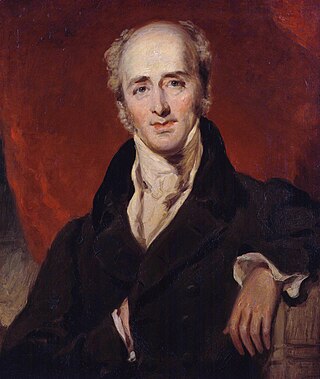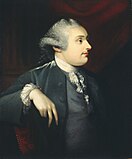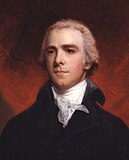The Whigs were a political party in the Parliaments of England, Scotland, Ireland, Great Britain and the United Kingdom. Between the 1680s and the 1850s, the Whigs contested power with their rivals, the Tories. The Whigs became the Liberal Party when the faction merged with the Peelites and Radicals in the 1850s. Many Whigs left the Liberal Party in 1886 over the issue of Irish Home Rule to form the Liberal Unionist Party, which merged into the Conservative Party in 1912.

William Wyndham Grenville, 1st Baron Grenville was a British Pittite Tory politician who was Prime Minister of the United Kingdom from 1806 to 1807, but was a supporter of the Whigs for the duration of the Napoleonic Wars. As prime minister, his most significant achievement was the abolition of the slave trade in 1807. However, his government failed to either make peace with France or to accomplish Catholic emancipation and it was dismissed in the same year.

The 1832 United Kingdom general election was held on 8 December 1832 to 8 January 1833, to elect members of the House of Commons, the lower house of Parliament of the United Kingdom. It was the first held in the Reformed House of Commons following the Reform Act, which introduced significant changes to the electoral system.

The Leader of His Majesty's Most Loyal Opposition, more commonly referred to as the Leader of the Opposition, is the person who leads the Official Opposition in the United Kingdom. The position is seen as the shadow head of government of the United Kingdom and thus the shadow prime minister of the United Kingdom.

The 1831 United Kingdom general election was held on 28 April 1831 to 1 June 1831, to elect members of the House of Commons, the lower house of Parliament. It saw a landslide win by supporters of electoral reform, which was the major election issue. As a result, it was the last unreformed election, as the following Parliament ensured the passage of the Reform Act 1832. Polling was held from 28 April to 1 June 1831. The Whigs won a majority of 136 over the Tories, which was as near to a landslide as the unreformed electoral system could deliver. As the Government obtained a dissolution of Parliament once the new electoral system had been enacted, the resulting Parliament was a short one and there was another election the following year. The election was the first since 1715 to see a victory by a party previously in minority.

The 1830 United Kingdom general election was held on 29 July 1830 to 1 September 1830 to elect members of the House of Commons, the lower house of Parliament. Triggered by the death of King George IV, it produced the first parliament of the reign of his successor, King William IV. Fought in the aftermath of the Swing Riots, it saw electoral reform become a major election issue. Polling took place in July and August and the Tories won a plurality over the Whigs, but division among Tory MPs allowed Earl Grey to form an effective government and take the question of electoral reform to the country the following year.

The 1826 United Kingdom general election was the 7th general election after the Acts of Union 1800, held on 7 June 1826 to 12 July 1826, to elect members of the House of Commons, the lower house of Parliament. It saw the Tories under the Earl of Liverpool win a landslide victory over the Whigs. In Ireland, liberal Protestant candidates favouring Catholic emancipation, backed by the Catholic Association, achieved significant gains.

The 1820 United Kingdom general election was held on 6 March 1820 to 14 April 1820, to elect members of the House of Commons, the lower house of Parliament. Triggered by the death of King George III, it produced the first parliament of the reign of his successor, King George IV. It was held shortly after the Radical War in Scotland and the Cato Street Conspiracy. In this atmosphere, the Tories under the Earl of Liverpool were able to win a substantial majority over the Whigs.
The 1818 United Kingdom general election was the 5th general election after the Acts of Union 1800, held on 17 June 1818 to 18 July 1818. It saw the Whigs gain a few seats, but the Tories under the Earl of Liverpool retained a majority of around 90 seats. The Whigs were divided over their response to growing social unrest and the introduction of the Corn Laws.

The 1802 United Kingdom general election was the first general election after the Acts of Union 1800, held from 5 July 1802 to 28 August 1802, to elect members of the House of Commons, the lower house of the new Parliament of the United Kingdom. The first Parliament had been composed of members of the former Parliaments of the Kingdom of Great Britain and the Kingdom of Ireland.

The 1806 United Kingdom general election was the second general election after the Acts of Union 1800, held from 29 October 1806 to 17 December 1806, to elect members of the House of Commons, the lower house of Parliament.

The 1812 United Kingdom general election was the fourth general election after the Union of Great Britain and Ireland, held on 5 October 1812 to 10 November 1812, taking place at the height of the Napoleonic Wars.
Buckinghamshire is a former United Kingdom Parliamentary constituency. It was a constituency of the House of Commons of the Parliament of England then of the Parliament of Great Britain from 1707 to 1800 and of the Parliament of the United Kingdom from 1801 to 1885.

In the first Parliament to be held after the Union of Great Britain and Ireland on 1 January 1801, the first House of Commons of the United Kingdom was composed of all 558 members of the former Parliament of Great Britain and 100 of the members of the House of Commons of Ireland.

The 1796 British general election returned members to serve in the 18th and last House of Commons of the Parliament of Great Britain. They were summoned before the Union of Great Britain and Ireland on 1 January 1801. The members in office in Great Britain at the end of 1800 continued to serve in the first Parliament of the United Kingdom (1801–02).
The 1790 British general election returned members to serve in the House of Commons of the 17th Parliament of Great Britain to be summoned after the merger of the Parliament of England and the Parliament of Scotland in 1707.
The 1768 British general election returned members to serve in the House of Commons of the 13th Parliament of Great Britain to be held, after the merger of the Parliament of England and the Parliament of Scotland in 1707.
Foxite was a late 18th-century British political label for Whig followers of Charles James Fox.
John Courtenay was an Irish officer in the British Army who became a politician in England. He was a Whig member of Parliament (MP) at Westminster from 1780 to 1807, and again in 1812.











